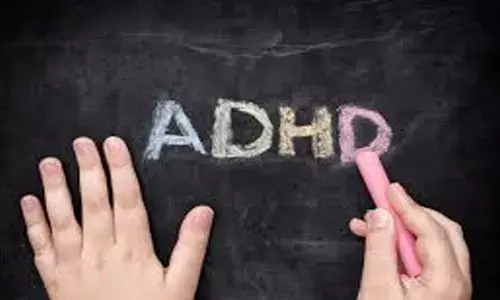- Home
- Medical news & Guidelines
- Anesthesiology
- Cardiology and CTVS
- Critical Care
- Dentistry
- Dermatology
- Diabetes and Endocrinology
- ENT
- Gastroenterology
- Medicine
- Nephrology
- Neurology
- Obstretics-Gynaecology
- Oncology
- Ophthalmology
- Orthopaedics
- Pediatrics-Neonatology
- Psychiatry
- Pulmonology
- Radiology
- Surgery
- Urology
- Laboratory Medicine
- Diet
- Nursing
- Paramedical
- Physiotherapy
- Health news
- Fact Check
- Bone Health Fact Check
- Brain Health Fact Check
- Cancer Related Fact Check
- Child Care Fact Check
- Dental and oral health fact check
- Diabetes and metabolic health fact check
- Diet and Nutrition Fact Check
- Eye and ENT Care Fact Check
- Fitness fact check
- Gut health fact check
- Heart health fact check
- Kidney health fact check
- Medical education fact check
- Men's health fact check
- Respiratory fact check
- Skin and hair care fact check
- Vaccine and Immunization fact check
- Women's health fact check
- AYUSH
- State News
- Andaman and Nicobar Islands
- Andhra Pradesh
- Arunachal Pradesh
- Assam
- Bihar
- Chandigarh
- Chattisgarh
- Dadra and Nagar Haveli
- Daman and Diu
- Delhi
- Goa
- Gujarat
- Haryana
- Himachal Pradesh
- Jammu & Kashmir
- Jharkhand
- Karnataka
- Kerala
- Ladakh
- Lakshadweep
- Madhya Pradesh
- Maharashtra
- Manipur
- Meghalaya
- Mizoram
- Nagaland
- Odisha
- Puducherry
- Punjab
- Rajasthan
- Sikkim
- Tamil Nadu
- Telangana
- Tripura
- Uttar Pradesh
- Uttrakhand
- West Bengal
- Medical Education
- Industry
Increased risk of ADHD linked to maternal autoimmune diseases, finds JAMA

In a recent development, researchers have suggested maternal autoimmune diseases to be associated with increased ADHD among children.The findings have been published in JAMA Pediatrics.
"These findings suggest possible shared genetic vulnerability between autoimmune disease and ADHD or a potential role for maternal immune activation in the expression of neurodevelopmental disorders in children. Future studies measuring disease activity, modifiers, and medication use are required to better understand the mechanisms underlying this association." The team further concluded.
Maternal autoimmune disease has been associated with increased risk of neurodevelopmental disorders in offspring, but few studies have assessed the association with attention-deficit/hyperactivity disorder (ADHD).
Researchers undertook the study to examine the association between maternal autoimmune disease and ADHD within a population-based cohort and combine results in a subsequent systematic review and meta-analysis.
This cohort study was conducted of singleton children born at term gestation (37-41 weeks) in New South Wales, Australia, from July 1, 2000, to December 31, 2010, and followed up until the end of 2014; and a systematic review evaluated articles from the MEDLINE, Embase, and Web of Science databases to identify all studies published before November 20, 2019.
A total of 12 610 children exposed to maternal autoimmune disease were propensity score matched (1:4) to 50 440 unexposed children, for a total cohort of 63 050. A child was considered to have ADHD if they had (1) an authorization or filled prescription for stimulant treatment for ADHD or (2) a hospital diagnosis of ADHD. Children linked to a first ADHD event before 3 years of age were excluded. Data were analyzed from January 13 to April 20, 2020.
The main outcome was child ADHD identified from stimulant authorization or prescription data and diagnoses in linked hospital admission records.
Data analysis revealed the following facts.
- In the population-based cohort analysis, 831 718 singleton, term infants born to 831 718 mothers (mean [SD] age, 29.8 [5.6] years) were assessed.
- Of 12 767 infants (1.5%) who were linked to a maternal autoimmune diagnosis, 12 610 were propensity score matched to 50 440 control infants, for a total study cohort of 63 050 infants. In this cohort, any autoimmune disease was associated with ADHD in offspring (HR, 1.30; 95% CI 1.15-1.46), as was type 1 diabetes (HR, 2.23; 95% CI, 1.66-3.00), psoriasis (HR, 1.66; 95% CI, 1.02-2.70), and rheumatic fever or rheumatic carditis (HR, 1.75; 95% CI, 1.06-2.89).
- Five studies (including the present study) were included in the meta-analysis. Any autoimmune disease (2 studies: HR, 1.20; 95% CI, 1.03-1.38), type 1 diabetes (4 studies: HR, 1.53; 95% CI, 1.27-1.85), hyperthyroidism (3 studies: HR, 1.15; 95% CI, 1.06-1.26), and psoriasis (2 studies: HR, 1.31; 95% CI, 1.10-1.56) were associated with ADHD.
For the full article follow the link: 10.1001/jamapediatrics.2020.5487
Primary source: JAMA Pediatrics
Dr Satabdi Saha (BDS, MDS) is a practicing pediatric dentist with a keen interest in new medical researches and updates. She has completed her BDS from North Bengal Dental College ,Darjeeling. Then she went on to secure an ALL INDIA NEET PG rank and completed her MDS from the first dental college in the country – Dr R. Ahmed Dental College and Hospital. She is currently attached to The Marwari Relief Society Hospital as a consultant along with private practice of 2 years. She has published scientific papers in national and international journals. Her strong passion of sharing knowledge with the medical fraternity has motivated her to be a part of Medical Dialogues.
Dr Kamal Kant Kohli-MBBS, DTCD- a chest specialist with more than 30 years of practice and a flair for writing clinical articles, Dr Kamal Kant Kohli joined Medical Dialogues as a Chief Editor of Medical News. Besides writing articles, as an editor, he proofreads and verifies all the medical content published on Medical Dialogues including those coming from journals, studies,medical conferences,guidelines etc. Email: drkohli@medicaldialogues.in. Contact no. 011-43720751


